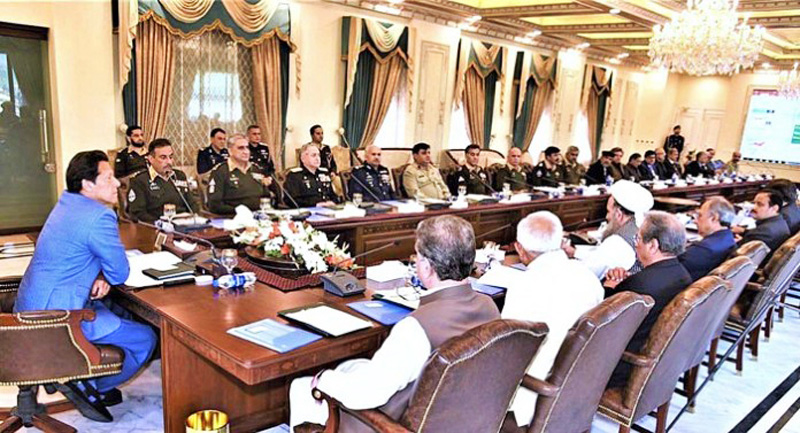 The government on Friday decided to close all educational institutions including all public and private schools, universities, vocational institutions and madaris in the country with an immediate effect and till April 5.
The government on Friday decided to close all educational institutions including all public and private schools, universities, vocational institutions and madaris in the country with an immediate effect and till April 5.
A meeting of the National Security Committee chaired by prime Minister Imran Khan also decided to close borders with Iran and Afghanistan for two weeks in a bid to prevent the spread of coronavirus.
The NSC set up a National Coordination Committee to effectively curb the spread of coronavirus by evaluating the situation on day-to-day basis. The meeting slapped a ban on public gatherings and suspended flight operations from all airports except Islamabad, Lahore and Karachi for international travels. However, seaports would remain operational with increased screening arrangements and surveillance so that trade activities are not be affected.
The NSC had a thorough discussion on evolving situation in the wake of new coronavirus cases in the country and resolved to ensure public safety and well-being, Special Assistant to Prime Minister on Health Dr Zafar Mirza told reporters at a press conference here along with SAPMs Dr Firdous Ashiq Awan and Moaeed Yousaf. He said the National Coordination Committee will comprise federal ministers concerned, chief ministers, NDMA chairman, surgeon general of Pakistan, representatives of Inter-Services Intelligence, Inter-Services Public Relations and Directorate of Military Operations, while he would be its convener. The committee will be authorized to include any other stakeholder, if needed, he said, adding it will hold its maiden meeting on Saturday at 4: 30 pm.
Dr Zafar said the evolving situation demanded to form such a high-level body so that the pandemic can be tackled through coordinated efforts after taking unanimous decisions at the national level. The National Disaster Management Authority (NDMA) will be the lead operational agency with the required funds at its disposal, he added.
The meeting decided that all educational/technical institutions, public and private, at all levels will remain closed for three weeks across the country. The entire Western border will be closed for two weeks for all human and commercial traffic. Sost border will also continue to remain closed for two further weeks. The Kartarpur Corridor will be closed for Pakistanis. However, Indian pilgrims will be allowed to continue visiting.
All public gatherings will be banned with immediate effect. Wedding halls and cinemas will be closed for two weeks. Large conferences will also be barred for the same period. Remaining PSL matches may be conducted without any crowd.
The meeting decided that minister for Religious Affairs and Inter-Faith Harmony and Chairman Council of Islamic Ideology will reach out to ulema and all relevant stakeholders to work out modalities for management of congregational religious services in light of coronavirus. It decided that chief justice of Pakistan and chief justices of provincial high courts will be requested to instruct all courts not to schedule cases of civil nature for three weeks and judicial magistrates and sessions judges to visit the relevant jails for three weeks to process remand and bail cases. Moreover, no visitors will be allowed to visit prisoners in jails for three weeks.
It was the first time that an NSC meeting was called on an emerging public health threat, with federal ministers on foreign affairs, religious affairs, aviation and education, advisor for finance, special assistants to prime minister on health, national security and information, all chief ministers along with chief secretaries, and provincial health ministers attending the meeting. Chairman Joint Chiefs of Staff Committee, COAS, CAS, CNS, surgeon general Pakistan Army and other senior military officials also attended the meeting.
The meeting took stock of the measures put in place in the wake of the COVID-19 pandemic. SAPM on health apprised the forum about the latest situation, preventive measures and detailed roadmap for dealing with the pandemic. He also spotlighted response and mitigation efforts undertaken to prevent the spread of COVID-19 in Pakistan that have ensured the country’s success in keeping the number of coronavirus cases to a minimum despite the fact that neighbouring China and Iran are two of the most affected countries.
Chairing the meeting, the prime minister called upon the entire nation to unite in playing a positive role in preventing the spread of COVID-19. “There is no need to panic. We are addressing this challenge as one nation by protecting ourselves through precautionary measures,” he said.
He directed all officials concerned to coordinate a comprehensive and unified national response to safeguard the health of the people of Pakistan. All necessary steps have been and will be taken to protect the people from coronavirus, he said.
The prime minister urged people to follow basic hygiene and precautionary measures and place their trust in the government as the health, safety and well-being of the people is his foremost priority.